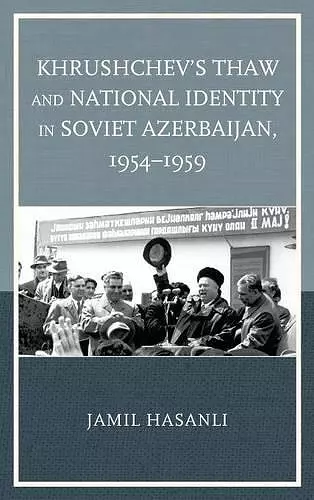Khrushchev's Thaw and National Identity in Soviet Azerbaijan, 1954–1959
Format:Hardback
Publisher:Lexington Books
Published:18th Dec '14
Currently unavailable, and unfortunately no date known when it will be back

On February 25, 1956, Soviet leader Nikita S. Khrushchev delivered the so-called “secret speech” in the Twentieth Party Congress of the CPSU in which he denounced Stalin’s transgressions and the cult of personality around the deceased dictator. Replete with sharp criticism of the Terror of the late 1930s, the unpreparedness of the USSR for the Nazi invasion, numerous wartime blunders, and the deportation of various nationalities, the speech reverberated throughout the subordinate Soviet republics. For republics such as Azerbaijan, the speech was an unmistakable signal to readjust the entire political orientation and figure out ways to redefine governance in post-Stalin era. Previously frozen under the mortal threat of Stalinist persecution, various forms of national self-expression began to experience rapid revival under the Khrushchev thaw. Encouraged by the winds of change at the Center, the Azeris cautiously began to reclaim possession of their administrative domain. Among other local initiatives, the declaration of the Azerbaijani language as the official language was one step that stood out in its audacity, for it was not pre-arranged with the Kremlin and defied the modus operandi of the Soviet leadership. Somewhat reformist in his intentions yet ignorant of the non-Slavic peripheries, Mr. Khrushchev had not foreseen the scenarios that would unfold as a result of its new tone and the developments that would come to be interpreted as the rise of nationalism in the republics. Jamil Hasanli’s research on 1950s’ Azerbaijan sheds light on this watershed period in Soviet history while also furnishing the reader with a greater understanding of the root causes of the dissolution of the USSR.
As its title suggests, Jamil Hasanli’s latest work will most likely appeal to two broad constituencies: those interested in the Khrushchev era of Soviet history and those with a focus on Azerbaijan or the wider Caucasus region. This book surely has more to offer to the latter of these two groups, though there should also be plenty to interest the former, too. This is clearly a book based upon meticulous research in the largely-untapped archives of Azerbaijan, and one which duly offers a number of interesting contributions to the emerging picture of the period in question…. With such a dearth of high quality scholarly literature on the history of Soviet Azerbaijan available in the English language—and most of that which does exist has been written by Hasanli—this is a particularly welcome addition to the field. * Europe-Asia Studies *
Jamil Hasanli is, by a clear distance, Azerbaijan’s most distinguished historian. Yet again, his archival work and command of sources have delivered a fascinating and original text, this time a book covering a blank spot in the historiography of Azerbaijan: the period of the Khrushchev thaw. This book will be essential reading for anyone interested in the twentieth-century history of the Caucasus. -- Thomas de Waal, Carnegie Endowment for International Peace
In Khrushchev's Thaw and National Identity in Soviet Azerbaijan, 1954-1959, Azerbaijan's leading historian Jamil Hasanli provides a fascinating account of history unfolding at a time and in a place where history was thought to be frozen. Hasanli’s path-breaking work uncovers the undercurrents of politics after Stalin in a Soviet borderland, and will be of immense interest to students of Soviet history, the Caucasus, and socialism and nationalism more broadly. -- Michael A. Reynolds, Princeton University
Jamil Hasanli's new book sheds light on a little-researched but pivotal period of Azerbaijani history, the 1950s, when political life and national consciousness were reawakened after the death of Stalin. Dr. Hasanli illustrates this reawakening by examining internal communist party debates over appointments and policies concerning Stalin's purge victims and survivors in literature and other arts. The book tells a fascinating story of national resilience, individual stories of personal integrity, survival, betrayal, and loss, and the struggle over policies. Hasanli places Azerbaijan in Soviet policy context and provides a powerful counter-example to the popular "nation building" thesis among scholars of Soviet nationalities policies. -- Audrey Altstadt, University of Massachusetts Amherst
ISBN: 9781498508131
Dimensions: 239mm x 163mm x 41mm
Weight: 848g
482 pages